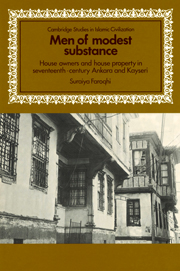Book contents
- Frontmatter
- Contents
- Tables
- Graphs
- Illustrations
- Figures
- Abbreviations
- Preface
- Introduction
- 1 Setting the scene: two cities of central Anatolia
- 2 The physical shape of urban houses
- 3 The cost of buying a house
- 4 Urban property-owners
- 5 The difficulties of an urban property-owner
- Conclusion
- Glossary
- Notes
- Bibliography
- Index
- Frontmatter
- Contents
- Tables
- Graphs
- Illustrations
- Figures
- Abbreviations
- Preface
- Introduction
- 1 Setting the scene: two cities of central Anatolia
- 2 The physical shape of urban houses
- 3 The cost of buying a house
- 4 Urban property-owners
- 5 The difficulties of an urban property-owner
- Conclusion
- Glossary
- Notes
- Bibliography
- Index
Summary
The present study has started out as a kind of ‘verbal archaeology’. Since physical remains of sixteenth or seventeenth century urban houses are scarce or inaccessible, we have attempted to exploit the traces which they have left in descriptions. Apart from reconstructing the houses themselves, we have tried to place them in the urban context of which they once formed a part. These houses might be located in a public street, or else be accessible only by a private right-of-way; they might be situated close to a mosque, or built right into the town or citadel walls. All these details are features which can be used in reconstructing the townscape, and thereby allow us to glimpse seventeenth-century townsmen interacting with their physical environment.
Such a reconstruction of an urban landscape may be of interest in itself, particularly where urban planners and restoration specialists are concerned. However, for the social historian, such an undertaking can only constitute a first step. If we want to understand the operation of Ottoman urban society during the seventeenth century, the houses, along with the prices paid for their purchase, provide us with evidence concerning stratification by wealth. But what was the yearly income of an urban patrician, compared to that of a weaver or a shoemaker? And more importantly, how closely did the hierarchy of wealth correspond to the locally established power structure? From the existence of extremely valuable houses, we can conclude that seventeenth-century Ankara and Kayseri contained a number of very wealthy families. Since not all the heads of these families are characterized as askerî, there must have been ways of enriching oneself – and maybe even of staying rich – even if one was not personally a member of the governmental apparatus of the Ottoman Empire.
- Type
- Chapter
- Information
- Men of Modest SubstanceHouse Owners and House Property in Seventeenth-Century Ankara and Kayseri, pp. 202 - 221Publisher: Cambridge University PressPrint publication year: 1987



